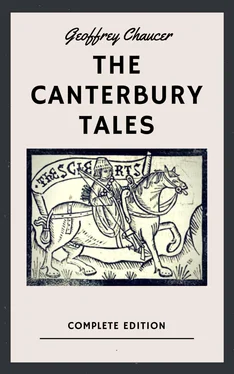Thus shall mankinde drench*, and lose their life." *drown
This carpenter answer'd; "Alas, my wife!
And shall she drench? alas, mine Alisoun!"
For sorrow of this he fell almost adown,
And said; "Is there no remedy in this case?"
"Why, yes, for God," quoth Hendy Nicholas;
"If thou wilt worken after *lore and rede*; *learning and advice*
Thou may'st not worken after thine own head.
For thus saith Solomon, that was full true:
Work all by counsel, and thou shalt not rue*. *repent
And if thou worke wilt by good counseil,
I undertake, withoute mast or sail,
Yet shall I save her, and thee, and me.
Hast thou not heard how saved was Noe,
When that our Lord had warned him beforn,
That all the world with water *should be lorn*?" *should perish*
"Yes," quoth this carpenter," *full yore ago*." *long since*
"Hast thou not heard," quoth Nicholas, "also
The sorrow of Noe, with his fellowship,
That he had ere he got his wife to ship?<30>
*Him had been lever, I dare well undertake,
At thilke time, than all his wethers black,
That she had had a ship herself alone.* *see note <31>
And therefore know'st thou what is best to be done?
This asketh haste, and of an hasty thing
Men may not preach or make tarrying.
Anon go get us fast into this inn* *house
A kneading trough, or else a kemelin*, *brewing-tub
For each of us; but look that they be large,
In whiche we may swim* as in a barge: *float
And have therein vitaille suffisant
But for one day; fie on the remenant;
The water shall aslake* and go away *slacken, abate
Aboute prime* upon the nexte day. *early morning
But Robin may not know of this, thy knave*, *servant
Nor eke thy maiden Gill I may not save:
Ask me not why: for though thou aske me
I will not telle Godde's privity.
Sufficeth thee, *but if thy wit be mad*, *unless thou be
To have as great a grace as Noe had; out of thy wits*
Thy wife shall I well saven out of doubt.
Go now thy way, and speed thee hereabout.
But when thou hast for her, and thee, and me,
Y-gotten us these kneading tubbes three,
Then shalt thou hang them in the roof full high,
So that no man our purveyance* espy: *foresight, providence
And when thou hast done thus as I have said,
And hast our vitaille fair in them y-laid,
And eke an axe to smite the cord in two
When that the water comes, that we may go,
And break an hole on high upon the gable
Into the garden-ward, over the stable,
That we may freely passe forth our way,
When that the greate shower is gone away.
Then shalt thou swim as merry, I undertake,
As doth the white duck after her drake:
Then will I clepe,* 'How, Alison? How, John? *call
Be merry: for the flood will pass anon.'
And thou wilt say, 'Hail, Master Nicholay,
Good-morrow, I see thee well, for it is day.'
And then shall we be lordes all our life
Of all the world, as Noe and his wife.
But of one thing I warne thee full right,
Be well advised, on that ilke* night, *same
When we be enter'd into shippe's board,
That none of us not speak a single word,
Nor clepe nor cry, but be in his prayere,
For that is Godde's owen heste* dear. *command
Thy wife and thou must hangen far atween*, *asunder
For that betwixte you shall be no sin,
No more in looking than there shall in deed.
This ordinance is said: go, God thee speed
To-morrow night, when men be all asleep,
Into our kneading tubbes will we creep,
And sitte there, abiding Godde's grace.
Go now thy way, I have no longer space
To make of this no longer sermoning:
Men say thus: Send the wise, and say nothing:
Thou art so wise, it needeth thee nought teach.
Go, save our lives, and that I thee beseech."
This silly carpenter went forth his way,
Full oft he said, "Alas! and Well-a-day!,'
And to his wife he told his privity,
And she was ware, and better knew than he
What all this *quainte cast was for to say*. *strange contrivance
But natheless she fear'd as she would dey, meant*
And said: "Alas! go forth thy way anon.
Help us to scape, or we be dead each one.
I am thy true and very wedded wife;
Go, deare spouse, and help to save our life."
Lo, what a great thing is affection!
Men may die of imagination,
So deeply may impression be take.
This silly carpenter begins to quake:
He thinketh verily that he may see
This newe flood come weltering as the sea
To drenchen* Alison, his honey dear. *drown
He weepeth, waileth, maketh *sorry cheer*; *dismal countenance*
He sigheth, with full many a sorry sough.* *groan
He go'th, and getteth him a kneading trough,
And after that a tub, and a kemelin,
And privily he sent them to his inn:
And hung them in the roof full privily.
With his own hand then made he ladders three,
To climbe by *the ranges and the stalks* *the rungs and the uprights*
Unto the tubbes hanging in the balks*; *beams
And victualed them, kemelin, trough, and tub,
With bread and cheese, and good ale in a jub*, *jug
Sufficing right enough as for a day.
But ere that he had made all this array,
He sent his knave*, and eke his wench** also, *servant **maid
Upon his need* to London for to go. *business
And on the Monday, when it drew to night,
He shut his door withoute candle light,
And dressed* every thing as it should be. *prepared
And shortly up they climbed all the three.
They satte stille well *a furlong way*. *the time it would take
"Now, Pater noster, clum,"<32> said Nicholay, to walk a furlong*
And "clum," quoth John; and "clum," said Alison:
This carpenter said his devotion,
And still he sat and bidded his prayere,
Awaking on the rain, if he it hear.
The deade sleep, for weary business,
Fell on this carpenter, right as I guess,
About the curfew-time,<33> or little more,
For *travail of his ghost* he groaned sore, *anguish of spirit*
*And eft he routed, for his head mislay.* *and then he snored,
Adown the ladder stalked Nicholay; for his head lay awry*
And Alison full soft adown she sped.
Withoute wordes more they went to bed,
*There as* the carpenter was wont to lie: *where*
There was the revel, and the melody.
And thus lay Alison and Nicholas,
In business of mirth and in solace,
Until the bell of laudes* gan to ring, *morning service, at 3.a.m.
And friars in the chancel went to sing.
This parish clerk, this amorous Absolon,
That is for love alway so woebegone,
Upon the Monday was at Oseney
With company, him to disport and play;
And asked upon cas* a cloisterer** *occasion **monk
Full privily after John the carpenter;
And he drew him apart out of the church,
And said, "I n'ot;* I saw him not here wirch** *know not **work
Since Saturday; I trow that he be went
For timber, where our abbot hath him sent.
And dwellen at the Grange a day or two:
For he is wont for timber for to go,
Or else he is at his own house certain.
Where that he be, I cannot *soothly sayn.*" *say certainly*
This Absolon full jolly was and light,
And thought, "Now is the time to wake all night,
For sickerly* I saw him not stirring *certainly
About his door, since day began to spring.
So may I thrive, but I shall at cock crow
Full privily go knock at his window,
That stands full low upon his bower* wall: *chamber
To Alison then will I tellen all
Читать дальше












